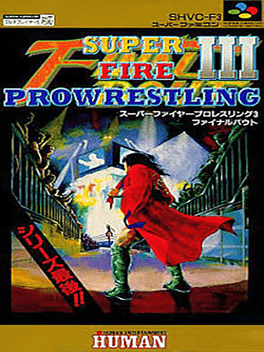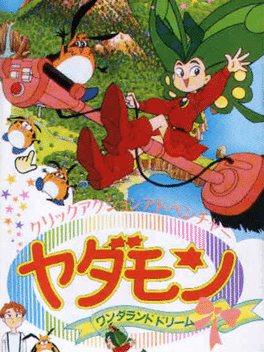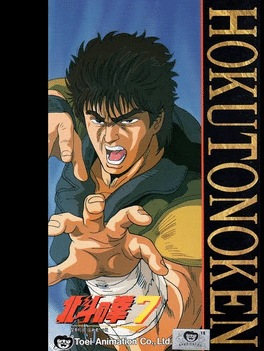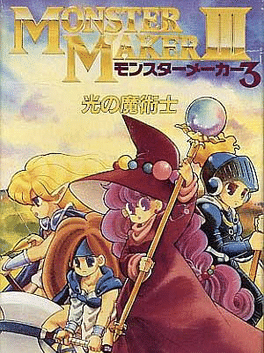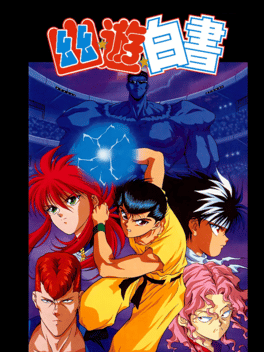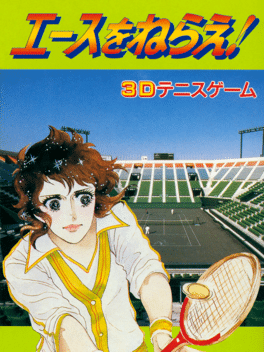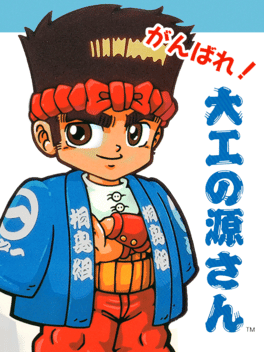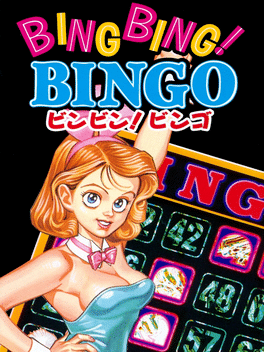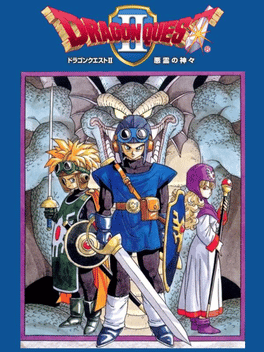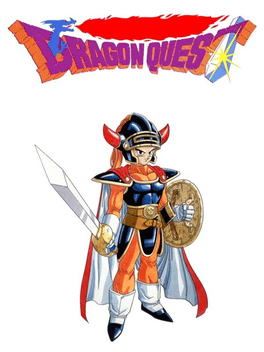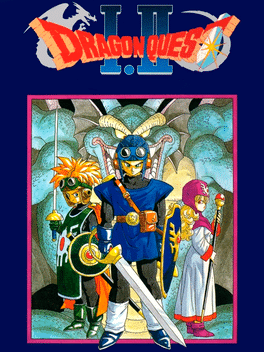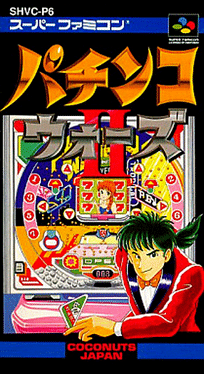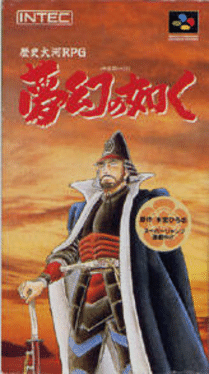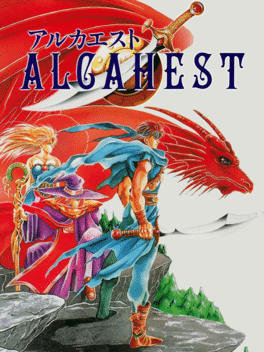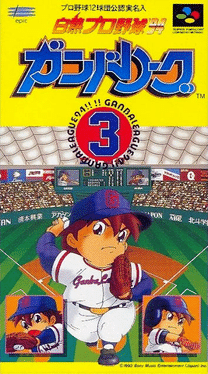New Super Famicom Games - Page 32
-
Super Fire Pro Wrestling 3: Final Bout
1993
The action is once again presented in an isometric ring, and players must use timing-based button presses to effectively grapple and pin their opponents. The player can choose from a number of wrestlers, many of whom are from international circuits like the WWE and WCW, who are all homages to actual wrestlers under different names. The player could also make their own wrestler in the game's "create-a-wrestler" editor mode, a series staple. -
Yadamon: Wonderland Dream
1993
Yadamon: Wonderland Dreams is a point and click adventure game developed by Sting Entertainment exclusively for the Super Famicom. The player, as the young witch Yadamon, her human friend Jean and her guardian fairy Timon, must navigate a series of screens to solve puzzles and reach the conclusion of the story. The game uses the SNES Mouse peripheral for its numerous puzzles. Yadamon is based on the anime of the same name about the eponymous troublemaking witch princess, who is banished to the human world to learn from her errors and to quench her curiosity about its high-tech wonders. The anime ran from August of 1992 to July of 1993, ending shortly before the release of this game. -
Zoku: The Legend of Bishin
1993
Neo Tokyo. After the new Great Depression of 2010, Mount Fuji erupts in a catastrophic manner in the year 2020. While Tokyo survives and the people managed to repair the areas destroyed by the volcano, it become infested with motorcycle gangs. An all-female gang known as the Bishin dominates with the help of their leader, Ryoko. Koji, a 20-year-old former professional boxer, and Lisa, a 16-year-old who used to be a high-ranking Bishin member but left, are attacked and one of them is kidnapped while the other sets out to take down the gang. -
Hokuto no Ken 7: Seiken Retsuden Denshousha he no Michi
1993
Find the successor of the fist! The dream matches you always wanted are now a reality! Memorable special moves and familiar settings. This is the most intense battle of the century! -
Monster Maker III: Hikari no Majutsushi
1993
Monster Maker III: Hikari no Majutsushi is a Role-Playing game, published by Sofel, which was released in Japan in 1993. -
YuYu Hakusho
1993
-
Ace wo Nerae!
1993
Ace wo Nerae!
1993
star 5.2A tennis game for the Super Famicom based on the 1970s manga and anime of the same name. -
Ganbare! Daiku no Gensan
1993
Hammerin' Harry and his friends have brought themselves a new house. They stand outside its front gate, watching it shine. They also watch a bomb fly past the house and destroy it. His friends are left devastated, and Harry seeks revenge on those responsible for the bombing. In Ganbare Daiku no Gensan, you must go through five stages (with two areas each), destroying workers that get in your way using your mallet. You can use it to perform two special attacks. One that sends fireballs going in all directions, and a more powerful one that sends shockwaves, destroying everything on screen. At the end of each area, a boss needs to be defeated in order to proceed to the next one. -
Bing Bing! Bingo
1993
Bing Bing! Bingo
1993
The basic concept of Bing Bing! Bingo is that the player is on a vacation to a private island somewhere in the world that is known for their Bingo-oriented lifestyle. He can either play Bingo through a slot machine, while skydiving, aplay a game of Bingo with Santa Claus, and an option to play Bingo on a pirate ship. There is also arm wrestling and a mode where players get to make imaginary wagers on the horses in case the player does not like Bingo. However, the numbers are announced in Japanese rather than English, so knowledge of Japanese numbers is vital for multiplayer action. Full card Bingo is mandatory for single player games but party games can use any variation of Bingo that the players consent to. A party mode is present for two players. -
Pachi-Slot Love Story
1993
Pachi-Slot Love Story is a Miscellaneous game, published by Coconuts Japan, which was released in Japan in 1993. -
Dragon Quest II
1993
Dragon Quest II
1993
star 7Remake of Dragon Warrior II released for the Super Famicom in the Dragon Quest I.II compilation. This remake includes updated graphics that retain the original look, sound of higher quality, and some changes in the gameplay and in the game world: certain locations are larger, some menu commands (such as "Stairs") are omitted, and there is a larger variety of items. -
Dragon Quest
1993
Dragon Quest
1993
star 7.9Remake of Dragon Warrior released for the Super Famicom in the Dragon Quest I.II compilation. This remake includes updated graphics that retain the original look, sound of higher quality, and some changes in the gameplay and in the game world: certain locations are larger, some menu commands (such as "Stairs") are omitted, and there is a larger variety of items. -
Dragon Quest I.II
1993
Dragon Quest I.II
1993
star 4.5Dragon Quest I.II is an enhanced remake of the first two Dragon Quest games. It has few modifications to gameplay, but the interface and graphics have been enhanced to be on a par with the 1992 Dragon Quest V, and the games have been rebalanced to make them slightly easier. -
Pachinko Wars II
1993
Pachinko Wars II
1993
Pachinko game published by Coconuts Japan in 1993 for the Super Famicom. It is the sequel to the 1992 Super Famicom game Pachinko Wars. -
Wondrous Magic
1993
Wondrous Magic
1993
Wondrous Magic is a Role-Playing game, developed by System Sacom and published by ASCII Entertainment, which was released in Japan in 1993. -
Downtown River City Baseball Story: Play Ball, Kunio!
1993
Tatsumi Tachibana, An honor student and a superb athlete, is the team captain of Nekketsu High's Baseball team. An injury on his shoulder bars him from leading Nekketsu High to Japan's National High School Baseball Tournament. His girlfriend and team manager of Nekketsu High's Baseball team, Rika Asano, is heartbroken and unable to fulfill her duties as team manager. This motivates Sugata Sanjuro, who has a crush on her, to lead the Nekketsu team in the baseball tournament. Todou Kounosuke holds a conference and announces that Japan's National High School Baseball Tournament will commence, and Nekketsu High will be lead by Sugata. Will Nekketsu be able to defeat Reihou Academy and the other teams with Kunio nowhere to be found? -
Doraemon 2: Nobita no Toys Land Daibouken
1993
Doraemon 2: Nobita no Toys Land Daibouken is an Action game, developed by SAS Sakata and published by Epoch, which was released in Japan in 1993. -
Yume Maboroshi no Gotoku
1993
A Super Famicom RPG set in a version of feudal Japan. It was developed by TOSE and published by Intec. Yume Maboroshi no Gotoku ("A Dreamlike Illusion", roughly) is an RPG set in a version of Sengoku era Japan. It otherwise plays like a standard JRPG, with a turn-based system that uses large enemy sprites in the center of the screen a la Phantasy Star or Dragon Quest. The game was one of two games ever published by Intec for the Super Famicom. They usually worked with the Turbo CD/PCE-CD system. It was never localized into English or released outside of Japan. -
Alcahest
1993
Alcahest
1993
star 7.9Alcahest is an action role-playing game with a top-down perspective that plays similar to The Legend of Zelda. It is divided into 8 stages that are progressed by finding items that aid the protagonist Alen on his quest, and end with a boss battle. After specific boss fights, the player will gain the abilities of one of the four elemental Guardians. Alen will also find five allies that will join him at predetermined points of some levels. They are the young wizard Garstein, the princess Elikshil, the knight Sirius, the android Magna and the shape-shifter dragon goddess Nevis. Though they cannot be controlled directly, allies will attack and use special moves when the corresponding button is pressed. -
Hakunetsu Pro Yakyuu '94 Ganba League 3
1993
Hakunetsu Pro Yakyuu '94 Ganba League 3 is the third and final Super Famicom baseball game from Sting Entertainment and Epic/Sony Records. Like its two predecessors, the game adopts a super-deformed cartoon style. Hakunetsu Pro Yakyuu '94 Ganba League 3 follows Hakunetsu Pro Yakyuu Ganba League (best known in the US as Extra Innings) and Hakunetsu Pro Yakyuu Ganba League '93.
